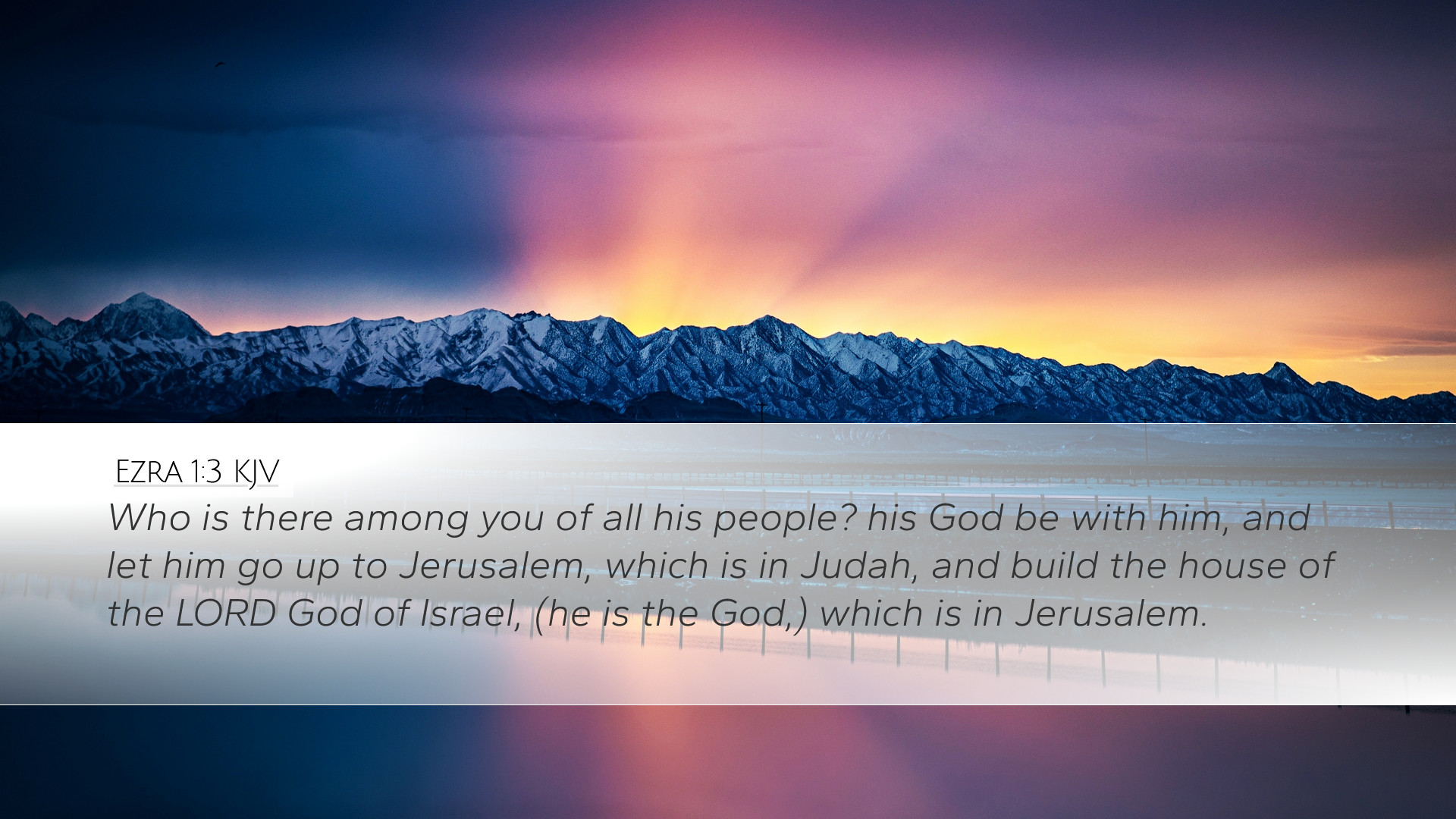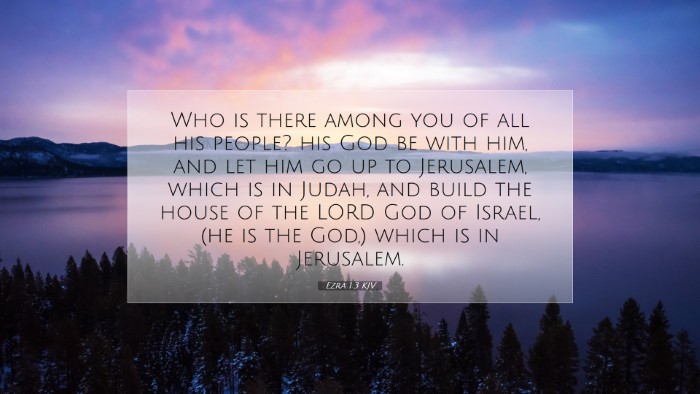Old Testament
Genesis Exodus Leviticus Numbers Deuteronomy Joshua Judges Ruth 1 Samuel 2 Samuel 1 Kings 2 Kings 1 Chronicles 2 Chronicles Ezra Nehemiah Esther Job Psalms Proverbs Ecclesiastes Song of Solomon Isaiah Jeremiah Lamentations Ezekiel Daniel Hosea Joel Amos Obadiah Jonah Micah Nahum Habakkuk Zephaniah Haggai Zechariah MalachiEzra 1:3
Ezra 1:3 KJV
Who is there among you of all his people? his God be with him, and let him go up to Jerusalem, which is in Judah, and build the house of the LORD God of Israel, (he is the God,) which is in Jerusalem.
Ezra 1:3 Bible Commentary
Commentary on Ezra 1:3
Ezra 1:3 (ESV): "Whoever is among you of all his people, may his God be with him, and let him go up to Jerusalem, which is in Judah, and rebuild the house of the Lord, the God of Israel—he is the God who is in Jerusalem."
Introduction
The decree in Ezra 1:3 marks a significant moment in the restoration of Israel after the Babylonian exile. It serves as a pivotal proclamation inviting the Jewish exiles to return to their homeland, igniting hope among the people of God. This commentary synthesizes insights from several public domain sources, exploring the theological, historical, and practical implications of this verse for contemporary readers.
The Context of Ezra
The book of Ezra follows the return of the Jewish exiles from Babylon. It recounts the restoration of worship and community life, focusing on the reconstruction of the Jerusalem Temple. The historical context is crucial for understanding the significance of this call to rebuild.
- Historical Background: The Babylonian captivity, lasting around 70 years, was a form of judgment for Israel's idolatry and disobedience. The decree by King Cyrus represents God's faithfulness to His covenant people and His promise of restoration.
- Persian Influence: Cyrus's decree underscores the role of foreign powers in God's redemptive plan, illustrating that God's sovereignty operates through history and politics.
Key Themes in Ezra 1:3
The Call to Return
This verse articulates a divine directive for the exiles: "let him go up to Jerusalem." This call resonates deeply with the covenantal promise of a place for God's people.
- Divine Invitation: The invitation acknowledges that restoration involves both God's initiative and human response. It stresses the communal aspect of returning to worship and fulfilling God's plan.
- Hope and Restoration: The plea signals hope in desolation, reminding readers that God actively works to restore His people.
The God of Israel
The phrase "the God of Israel" emphasizes the covenant identity of God, who remains faithful despite Israel's faithlessness.
- Theological Significance: It reinforces the idea that God’s presence is linked to a specific place, Jerusalem, which is portrayed as the center of divine worship and activity.
- Universal and Local Implications: While the text is specific to the Jewish people, it also speaks to the broader theme of God's presence among His people, transcending geographical boundaries.
Commission to Rebuild
The command to "rebuild the house of the Lord" pertains not only to physical restoration but also to spiritual renewal.
- Spiritual Rebuilding: The act of rebuilding the Temple symbolizes the restoration of worship and the reinvigoration of covenantal life among the people.
- Role of Community: The rebuilding project requires collective effort, paralleling the Church’s call today to collaborate in the work of ministry and restoration in the world.
Commentator Insights
Matthew Henry
Henry emphasizes the importance of community participation in the rebuilding efforts, noting that the opportunity extended by Cyrus marks a pivotal response to God's promises. He posits that this decree reflects God's providence and the rekindling of hope among His people.
Albert Barnes
Barnes highlights the significant role of Cyrus not merely as a political leader but as an instrument of God’s will. His commentary elucidates how Cyrus' decree proclaimed the right of the Jews to rebuild their Temple, symbolizing divine favor and restoration after a long period of suffering.
Adam Clarke
Clarke elaborates on the individual nature of the call, encouraging each believer to participate in the restoration. He underscores the importance of each person's involvement in rebuilding God's work, drawing analogies between the physical and spiritual rebuilding required in all of our lives.
Application and Reflection
This verse beckons modern believers to consider their own involvement in God's redemptive work.
- Personal Reflection: What areas of our lives require rebuilding? How can we respond to God’s invitation in our personal and communal contexts?
- Community Engagement: As the Church seeks to fulfill its mission, how can we support efforts to rebuild faith, community, and worship in our surroundings?
- The Role of Prayer: This verse encourages persistent prayer for God’s guidance and protection as efforts to rebuild and restore continue.
Conclusion
Ezra 1:3 serves as a powerful message of hope, restoration, and divine calling—resonating with messages throughout Scripture. It is an invitation to actively participate in God’s ongoing work, reinforcing the necessity of both individual and communal commitment to reconstructing the foundations of faith and worship.


